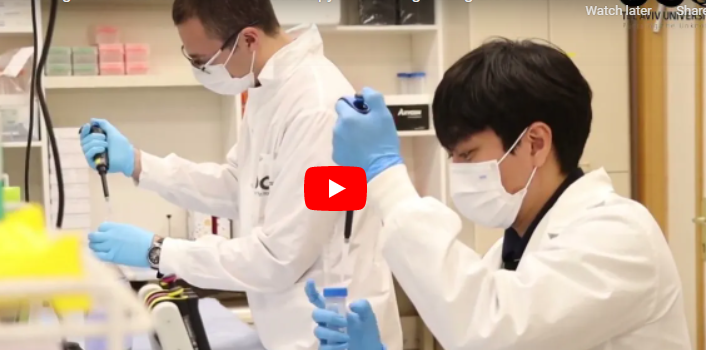A nanometer is one-billionth of a meter, and a nanoparticle is particle is a tiny particle that ranges between one and 100 nanometers in size.
Even though it’s undetectable to the naked eye, a single nanoparticle can have two jobs – enhancing the effectiveness of chemotherapy and reinvigorating the immune system.
Chemo-immunotherapy is a combination of “standard-of-care” chemotherapy with immunotherapy. It is considered the most advanced therapeutic treatment for various types of cancers, but many cancer patients still respond poorly to the current protocol of chemo-immunotherapy.
According to researchers at Tel Aviv University (TAU), nanotherapeutics can be a boosting agent for drug delivery, who proved that a drug-delivery system based on lipid (fat) nanoparticles could use RNA in the cell to overcome resistance to both chemotherapy and immunotherapy in cancer treatments.
The shortcode is missing a valid Donation Form ID attribute.
The study opens a new path to a personalized and precisely targeted battle against cancer. The results were published on the cover of the scientific journal Advanced Materials under the title “Dual-Targeted Lipid Nanotherapeutic Boost for Chemo-Immunotherapy of Cancer.”
The study was led by TAU vice president for research and development, Prof. Dan Peer, who heads the Laboratory of Precision Nanomedicine at the Shmunis School of Biomedicine and Cancer Research in the Wise Faculty of Life Sciences. Together with post-doctoral researcher Dr. Seok-Beom Yong of South Korea. The study was funded via an ERC grant from the European Union and a research scholarship from the Korean government.
Chemo-immunotherapy, which is considered the most advanced standard of care for various types of cancer, destroys cancer cells. Immunotherapy encourages the cells of the immune system to identify and attack the remaining cancer cells, but many patients fail to respond to it. This means that the treatment is not sufficiently targeted. Peer and his team are the first in the world to prove the feasibility of a drug-delivery system based on lipid nanoparticles that release their load only at the specifically targeted cells – cancer cells for chemotherapy and immune cells for immunotherapy.
“In our system, a single nanoparticle can operate in two different arenas,” explained Peer. “It increases the sensitivity of cancer cells resistant to chemotherapy while also reinvigorating immune cells and increasing their sensitivity to cancer cells. Thus, we provide two different treatments at very different sites with one precisely targeted nanoparticle. We tested this system in two types of lab models – one for metastasized melanoma (advanced skin cancer) and the other for a local solid tumor. In both populations, we observed positive effects of our delivery system.”
Their discovery builds on another recent discovery – an enzyme called HO1 is used by cancer cells to resist chemotherapy and conceal themselves from the immune system. Silencing HO1 in the tumor is thus considered an optimal strategy in clinical research, but so far, all attempts to silence the enzyme have led to severe side effects.
“This is the first instance of a single drug based on an RNA-loaded nanoparticle doing two very different, even opposite jobs,” added Peer. “This is only an initial study, but it has enormous potential in the ongoing fight against cancer.”
“Chemo-resistant tumors pose a significant challenge in our endless battle against cancer,” declared Peer. “We aim to silence the enzyme HO1 that enables tumors to develop chemotherapy resistance and conceal themselves from the immune system. But existing methods for silencing HO1 resemble using an F-16 fighter jet to blast a tiny ant.
He added that “our new nano-drug knows how to precisely target the cancer cells, silence the enzyme and expose the tumor to chemotherapy, without causing any damage to surrounding healthy cells. Afterward, the same nanoparticle goes on to the T-cells of the immune system and reprograms them to identify cancer cells. Active, highly aggressive tumors can conceal themselves from the immune system, and we restore the immune cells’ ability to recognize cancer as a foreign body and attack it,” he concluded.
The shortcode is missing a valid Donation Form ID attribute.



